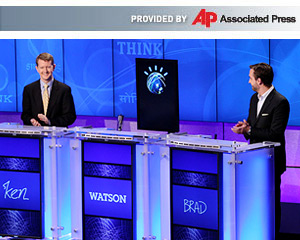By Frazier Moore, Associated Press | Wednesday, February 16, 2011
NEW YORK — Note to self: Never play "Jeopardy!" with a supercomputer.
That's a useful lesson for me or any mortal who has followed the Man vs. Machine faceoff this week on the popular trivia game show, where on Wednesday the second of two exhibition matches sealed the deal: Watson, the IBM-created megabrain, officially buried his flesh-and-blood opponents, veteran "Jeopardy!" champs Ken Jennings and Brad Rutter.
 |
Ken Jennings and Brad Rutter vs. "Watson" CBS |
For crushing his rivals, Watson gets a total prize of $1 million, which IBM has said will go to the charities World Vision and World Community Grid.
The vanquished Jennings and Rutter get $300,000 and $200,000, respectively, half of which each said they would be donating to charities.
"I for one welcome our new computer overlords," Jennings wrote alongside his correct Final Jeopardy response ("Dracula" author Bram Stoker), apparently trading on a line from "The Simpsons." Clearly Jennings is a good sport with a sense of humor.
| Request up to 500,000 U.S. addresses now |
Watching this week's clash, I was reminded of the legend of John Henry, the folk hero from a bygone century who was born with a hammer in his hand and raced against a mechanized, steam-powered drill. He won that race. Then, having made his point, he died of exhaustion.
Fortunately, neither Jennings nor Rutter expired from mental exertion. Nor did they beat the machine.
But these humans put up a fight. Unlike Tuesday, when Watson breezed through most of the half-hour, on Wednesday he seemed distracted, not quite on his game, while his opponents jumped in with correct responses such as Ikea, Robert De Niro, and F1 (the computer that is also the abbreviation for Grand Prix auto racing).
Watson also seemed ill-equipped for the "One Buck or Less" category (maybe he should shop more).
But nothing could stop him.
Watching these "Jeopardy!" episodes, I thought of one of cinema's most devilish control freaks, HAL the computer from the sci-fi masterpiece, "2001: A Space Odyssey." I wondered what Watson, seemingly so genial as he played the game, would have said had someone ordered him to "open the pod bay doors."
"I'm sorry, Alex. I'm afraid I can't do that," Watson might have replied as he went psycho.
Meanwhile, this contest fed my suspicion that longtime "Jeopardy!" host Alex Trebek might actually be a kindred spirit of Watson. Isn't there something pleasantly robotic about Trebek's on-air style? Was he, too, born at IBM?
Granted, watching Watson's instant, often flawless command of information was inspiring, especially for someone like me, who often can't even remember where I set my reading glasses.
The occasions when he stumbled only made him more endearing — almost human.
On Tuesday's show, Watson blew Final Jeopardy, whose clue was: "Its largest airport is named for a World War II hero; its second largest, for a World War II battle."
Both Rutter and Jennings knew the right response was Chicago. Watson somehow came up with Toronto.
And, although usually a literary whiz, he was flummoxed by a Double Jeopardy question on Wednesday. His response: Dorothy Parker. Correct response: "The Elements of Style."
It was fun to see Watson jump the tracks. And it was fun to see him recover the next moment, as if nothing had happened. Right or wrong, Watson (named for IBM founder Thomas J. Watson) never lost his composure.
And mostly he ruled, proving himself conversant in subjects as far-flung as leprosy and Franz Liszt, the Olympics and hedgehogs.
But as thrilling as it's been to watch Watson work, it's also been unnerving.
Who wanted to see champs such as Rutter (the show's all-time money-winner with $3.25 million) sweat, or Jennings (who has the longest winning streak at 74 games) sidelined, radiating frustration!
I had to wonder if the deck was stacked against them. The tournament, which was taped last month at the IBM research center in Yorktown Heights, N.Y., obviously gave Watson the home field advantage. Watson doesn't travel, but still ... a bit unfair?
Now that the challenge is decided, I find consolation in remembering that Watson, the computer that trounced a pair of very smart humans, is himself the product of humans.
But still, I can't get past a chilling thought that this digital know-it-all might have lots of other tricks up his sleeve. For example, after winning at "Jeopardy!" could Watson have sat down and wrote this story, instead of a human?